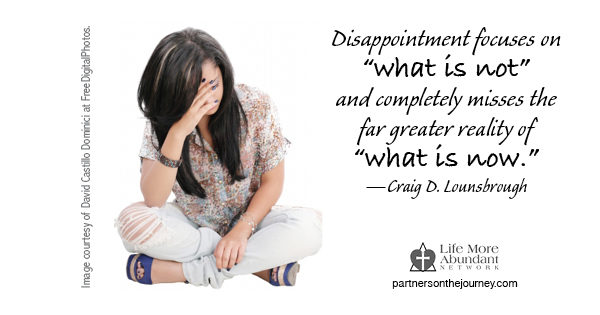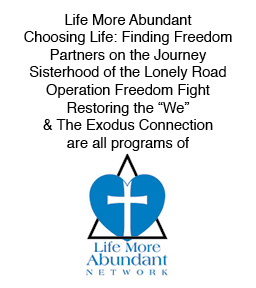Disappointment.
Life is full of it!
It sure doesn’t feel good, but it’s really quite natural and normal. Everyone experiences it at some point because our expectations of how things should turn out frequently don’t align with what actually happens.
That’s what it’s all about, you know. Disappointment is that intense feeling of sadness or displeasure that sweeps over us when our hopes or expectations are not fulfilled.
CONFESSION TIME?
As we near the end of the year, I realize that I am wrestling with a number of disappointments myself. It’s been another busy and chaotic year. So many situations and events have distracted me from reaching my goals, both personal and professional.
There were so many resources I had hope to prepare for you this year, so many skills, like video production and online webinar facilitation that I wanted to develop, and so many connections that I had intended to deepen.
But, it just didn’t happen.
On a personal level, I’m extremely disappointed that I don’t feel one bit closer to being the thinner, healthier, more focused and more efficient person that I set out to become this year.
How about you? Are you facing a bundle of disappointments as well? Is reality falling a little short of your hopes and expectations?
THE DANGER OF DISAPPOINTMENT
Disappointment is jam-packed with emotion: anger, hurt, sadness, disenchantment, dissatisfaction and a whole lot more. It’s similar to regret, but even more complicated. Regret usually zeros in on the personal choices that contributed to a poor outcome. Once we’ve become aware of where we went wrong, we can choose to make different choices in the future. Although it may be difficult to turn our mistakes around, we still retain a certain amount of power to remedy both the situation and our feelings.
When we are feeling disappointed, however, we are focusing almost completely on the outcome itself. We give little thought to how we got there, and look only on what we ended up with. The narrowness of that view makes it more difficult to see any way out. That, coupled with the sheer weight of the mish-mash of emotions, can make it extremely difficult to keep from slipping into a victim role. Victim thinking has a way of paralyzing us and keeping us stuck.
MY STORY
Many years ago, when my, now grown children were only two and four years old, their father left us. Until the day he decided he wanted a divorce, he and I had always agreed that I would be stay-at-home mother and I absolutely loved that role!
After he left, however, it became clear that if the kids and I were going to survive, I would have to go to work. I was beside myself with disappointment. This was NOT the plan we had agreed on. I was supposed to be home with my kids to teach and care for them and support them in all those important “firsts” in their lives.
But I really had no choice, so I found a job. I did well and “climbed the ladder.” But, deep inside I fought against it for years. Just thinking about my situation made me both angry and sad. It seemed like I had no control over my own life. In spite of my career success, I felt like a huge failure, because I wasn’t able to be there for the kids 24/7 as I had expected to be. It was MANY years before I finally made peace with the change.
Everything turned out OK. My kids survived and grew up to be productive citizens. And, of course, I survived as well, BUT, my inability to get past my disappointment made me miserable for a very long time. For years I carried around an underlying dissatisfaction with my life that caused me to miss a lot of the good things that could have been mine. I cheated ME!
AVOIDING DISAPPOINTMENT
Some people insist, “If you expect nothing, you can never be disappointed” . . . but there are, indeed, worse things than disappointment. Think about how depressing life would be if it was void of anything to look forward to—if you had no hopes, no dreams, no goals to strive for.
Trying to insulate our lives from ever being disappointed, actually prevents us from experiencing many of the joys and satisfactions of life.
In reality, we will never be able to completely avoid disappointments, no matter how hard we try. Nor should we, especially since it’s the very process of dealing with disappointment that actually helps us grow and gain wisdom.
Expectation has brought me disappointment.
Disappointment has brought me wisdom.
Acceptance, gratitude and appreciation
have brought me joy and fulfillment.
—Rasheed Ogunlaru, life coach
I like what Joel Osteen said in his book Your Best Life Now: 7 Steps to Living at Your Full Potential:
“You must make a decision that you are going to move on. It won’t happen automatically.
You will have to rise up and say ‘I don’t care how hard this is. I don’t care how disappointed I am.
I’m not going to let this get the best of me. I’m moving on with my life.”
HOW DO YOU MOVE ON?
Moving on is certainly different than merely avoiding or attempting to forget or deny the intensity of what you are experiencing. It is the process of intentionally working through the issue until you come out on the other side firmly grasping the insights that were hiding in the experience.
In the next blog post, we’ll take a closer look at the steps to maneuvering through that life-enhancing process. Hope you’ll join us!
“Why, my soul are you downcast? Why so disturbed within me? Put your hope in God, for I will yet praise him, my Savior and my God.” — Psalm 42:5
TODAY’S CHAT: What, if anything, are you feeling disappointed about right now? Take a few minutes to jot down anything that comes to mind. Describe any ways these unresolved disappointments are changing how you think or act.



Leave A Response